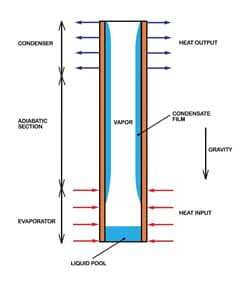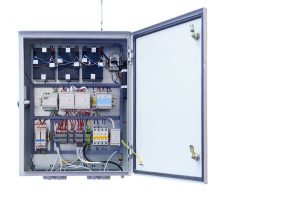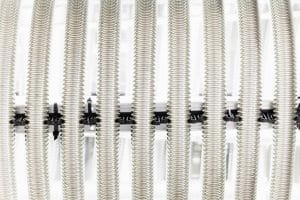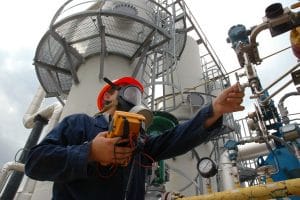 While there are several ways to address the many thermal management challenges that can arise with any application, the concept of a thermosyphon has become an increasingly more popular one. Thermosyphons describe innovative heat transfer mechanisms that combine phase-change cooling principles with the force of gravity to create an eco-friendly, closed-loop system for eliminating electrical waste heat. Today, we examine how the method occurs and how heat exchangers utilize thermosyphon technology to provide efficient, reliable, and highly effective electrical thermal management solutions to all industries. (more…)
While there are several ways to address the many thermal management challenges that can arise with any application, the concept of a thermosyphon has become an increasingly more popular one. Thermosyphons describe innovative heat transfer mechanisms that combine phase-change cooling principles with the force of gravity to create an eco-friendly, closed-loop system for eliminating electrical waste heat. Today, we examine how the method occurs and how heat exchangers utilize thermosyphon technology to provide efficient, reliable, and highly effective electrical thermal management solutions to all industries. (more…)
Why Heat Exchangers Come in a Variety of Designs
 Technology has become more than just an advantage to the biggest and wealthiest companies. Now, businesses of all sizes rely on advanced technology of all forms for everything from administrative work to large-scale manufacturing operations and everything between. Because all technologies rely on appropriate thermal management to prevent overheating, heat exchangers have been created in an increasingly wider variety of designs to meet those needs efficiently. This helps ensure that increasingly more types of advanced technology can function properly and provide the results they were designed for. (more…)
Technology has become more than just an advantage to the biggest and wealthiest companies. Now, businesses of all sizes rely on advanced technology of all forms for everything from administrative work to large-scale manufacturing operations and everything between. Because all technologies rely on appropriate thermal management to prevent overheating, heat exchangers have been created in an increasingly wider variety of designs to meet those needs efficiently. This helps ensure that increasingly more types of advanced technology can function properly and provide the results they were designed for. (more…)
Reasons Why Food & Beverage Companies Use Heat Exchangers
 Food and beverage companies invest in advanced technology for the same reasons that other industries do – it’s necessary to remain productive and successful in increasingly more competitive markets. Besides meeting increasing demands for products and services, that competitive edge also includes keeping costs manageable and optimizing employee productivity. For many food and beverage companies, heat exchangers are an important part of their technological investments, allowing them to streamline thermal management and other traditionally costly and/or cumbersome processes. (more…)
Food and beverage companies invest in advanced technology for the same reasons that other industries do – it’s necessary to remain productive and successful in increasingly more competitive markets. Besides meeting increasing demands for products and services, that competitive edge also includes keeping costs manageable and optimizing employee productivity. For many food and beverage companies, heat exchangers are an important part of their technological investments, allowing them to streamline thermal management and other traditionally costly and/or cumbersome processes. (more…)
The Energy Efficiency of Modern Heat Exchangers
 After implementing heat exchangers for their electrical thermal management needs, companies often immediately realize the benefits in terms of increased productivity and streamlined operations. Over time, however, one of the greatest and most impactful benefits is the level of energy efficiency that heat exchangers provide. Thanks to their innovative heat transfer methods and other thermal management concepts, heat exchangers allow operations to dramatically reduce their energy consumption without sacrificing their ability to consistently keep vital equipment and technology operating properly. (more…)
After implementing heat exchangers for their electrical thermal management needs, companies often immediately realize the benefits in terms of increased productivity and streamlined operations. Over time, however, one of the greatest and most impactful benefits is the level of energy efficiency that heat exchangers provide. Thanks to their innovative heat transfer methods and other thermal management concepts, heat exchangers allow operations to dramatically reduce their energy consumption without sacrificing their ability to consistently keep vital equipment and technology operating properly. (more…)
Considerations that Come with Cooling Electrical Enclosures
 Electrical thermal management has long been both a challenge and an avenue for innovation when it comes to technology and industrial applications. The more powerful technology and machinery becomes, the more important it is to control the waste heat that it emits. Also, the more of an impact that malfunctioning technology will have on any given company’s operational costs and productivity. Given the many considerations that come with cooling electrical enclosures, heat exchangers are among the most efficient ways for companies to address them all without spending exorbitant amounts of capital just on thermal management. (more…)
Electrical thermal management has long been both a challenge and an avenue for innovation when it comes to technology and industrial applications. The more powerful technology and machinery becomes, the more important it is to control the waste heat that it emits. Also, the more of an impact that malfunctioning technology will have on any given company’s operational costs and productivity. Given the many considerations that come with cooling electrical enclosures, heat exchangers are among the most efficient ways for companies to address them all without spending exorbitant amounts of capital just on thermal management. (more…)
How Does Phase-Change Cooling Work?
 Phase-change cooling technology is just one of the many eco-friendly and efficient thermal management methods that modern heat exchangers employ. Along with other methods such as conduction and natural/forced convection, phase-change cooling provides a much more efficient and reliable way to cool electrical enclosures than more conventional air conditioners and air compressors. By utilizing the natural properties of certain cooling fluids (such as water), heat exchangers provide continuous electrical cooling and other thermal management processes in a much safer and more energy-efficient manner. (more…)
Phase-change cooling technology is just one of the many eco-friendly and efficient thermal management methods that modern heat exchangers employ. Along with other methods such as conduction and natural/forced convection, phase-change cooling provides a much more efficient and reliable way to cool electrical enclosures than more conventional air conditioners and air compressors. By utilizing the natural properties of certain cooling fluids (such as water), heat exchangers provide continuous electrical cooling and other thermal management processes in a much safer and more energy-efficient manner. (more…)
How Heat Exchangers Impact Wastewater Treatment
 Few industries can say that they haven’t been significantly impacted by the advent of modern heat exchangers. From manufacturing and agriculture to advanced technology and more, innovative thermal management has paved the way for substantial advancement in a number of different areas. Wastewater treatment is one such area, and like electrical thermal management, it’s a consideration that can sometimes be burdensome and costly for companies to keep up with. However, the implementation of heat exchanger technology has impacted wastewater treatment processes as much as any other industry, and the benefits extend well beyond just saving companies money on overall thermal management. (more…)
Few industries can say that they haven’t been significantly impacted by the advent of modern heat exchangers. From manufacturing and agriculture to advanced technology and more, innovative thermal management has paved the way for substantial advancement in a number of different areas. Wastewater treatment is one such area, and like electrical thermal management, it’s a consideration that can sometimes be burdensome and costly for companies to keep up with. However, the implementation of heat exchanger technology has impacted wastewater treatment processes as much as any other industry, and the benefits extend well beyond just saving companies money on overall thermal management. (more…)
Safe and Efficient Cooling in Hazardous Applications
 Technology that is employed into hazardous locations, like extreme climates or oil and gas fields, have always had to be crafted with several special considerations in mind. Given the volatile environments that they operate in, such technological solutions have to be as safe, sturdy, and reliable as they are efficient and effective. For example, besides successfully keeping electrical enclosures and equipment safe, heat exchangers that operate in hazardous conditions are also designed to ensure a tight and formidable seal against any environmental elements entering the enclosures they’re attached to. This often makes them ideal for the highest performance applications, including those that are located in volatile locations. (more…)
Technology that is employed into hazardous locations, like extreme climates or oil and gas fields, have always had to be crafted with several special considerations in mind. Given the volatile environments that they operate in, such technological solutions have to be as safe, sturdy, and reliable as they are efficient and effective. For example, besides successfully keeping electrical enclosures and equipment safe, heat exchangers that operate in hazardous conditions are also designed to ensure a tight and formidable seal against any environmental elements entering the enclosures they’re attached to. This often makes them ideal for the highest performance applications, including those that are located in volatile locations. (more…)
A Greener Way to Prevent Electrical Overheating
 When it comes to electrical thermal management, there are several considerations beyond how effectively a system can operate without overheating. For instance, air conditioners can successfully accomplish this goal for prolonged periods of time, but the costs of energy and maintenance associated with them often make them cumbersome in many ways. They also make it more difficult for companies to successfully transform their operations to become greener and more eco-friendly. In addition to reinventing the way electrical enclosures are cooled, heat exchangers also help address the increasingly more pressing concern of going green. (more…)
When it comes to electrical thermal management, there are several considerations beyond how effectively a system can operate without overheating. For instance, air conditioners can successfully accomplish this goal for prolonged periods of time, but the costs of energy and maintenance associated with them often make them cumbersome in many ways. They also make it more difficult for companies to successfully transform their operations to become greener and more eco-friendly. In addition to reinventing the way electrical enclosures are cooled, heat exchangers also help address the increasingly more pressing concern of going green. (more…)
What Companies Save with the Help of Heat Exchangers
 Saving costs has always been a principle of good business, but there are some costs that have historically been a necessary burden. For example, electrical thermal management used to require large air conditioning apparatus that was costly to operate and cumbersome to maintain. However, the need to prevent machinery and equipment from overheating is so great that those costs and frequent maintenance were simply par for the course. For many applications, that all changed with the advent of heat exchangers, which offered even more consistent electrical cooling without the additional costs that come with more conventional methods. (more…)
Saving costs has always been a principle of good business, but there are some costs that have historically been a necessary burden. For example, electrical thermal management used to require large air conditioning apparatus that was costly to operate and cumbersome to maintain. However, the need to prevent machinery and equipment from overheating is so great that those costs and frequent maintenance were simply par for the course. For many applications, that all changed with the advent of heat exchangers, which offered even more consistent electrical cooling without the additional costs that come with more conventional methods. (more…)







